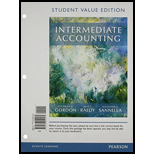
To explain: The meaning of stockholder’ equity.
Answer to Problem 15.1Q
Stockholders’ equity refers to the amount of share of the stockholders in the company’s assets. It refers to the aggregate amount after the distinction between the assets and liabilities of a company.
Explanation of Solution
Stockholders’ Equity:
Stockholders’ equity or also referred to as the shareholders’ equity in a company is the total share of a shareholder in the company’s assets after all the liabilities of the company are paid off. A stockholder owns the retained
Retained earnings : It refers to the amount of profit which is shared among the stockholders’ of the company from the total profit earned in a given accounting year.- Capital accounted: The total amount of capital a shareholder accounts in the company or has given as investment in the company refers to the capital accounted for by the shareholder.
- Accumulated income: Another source of income (or loss) for the shareholder can be from the revaluation done of different assets and liabilities in the company that results to build accumulated or comprehensive capital in the company.
Therefore, the stockholders’ are in a way the owner in the company up to the amount of capital invested.
Want to see more full solutions like this?
Chapter 15 Solutions
Intermediate Accounting - Myaccountinglab - Pearson Etext Access Card Student Value Edition
- Felix Mounts has a cost formula for its supplies cost of $1,450 per month plus $22 per mount. For the month of March, the company planned for activity of 530 mounts, but the actual level of activity was 520 mounts. The actual supplies cost for the month was $12,000. The variance for supplies cost in March would be _.arrow_forwardCan you solve this financial accounting question with accurate accounting calculations?arrow_forwardI want to this question answer for General accounting question not need ai solutionarrow_forward
- Compute the amount of direct materialarrow_forwardexplain properly all the answer for General accounting question Please given fastarrow_forwardSuppose the required reserve ratio is 0.20 and individuals hold no cash. Total bank deposits are $150 million, and the banks hold $40 million in reserves. How much more money can the bank create if it does not hold excess reserves?arrow_forward
- I am looking for a step-by-step explanation of this financial accounting problem with correct standards.arrow_forwardI am looking for the correct answer to this general accounting question with appropriate explanations.arrow_forwardWhat were orion techs free cash flow and earning for the period? General accountingarrow_forward
- Suppose the required reserve ratio is 0.20 and individuals hold no cash. Total bank deposits are $150 million, and the banks hold $40 million in reserves. How much more money can the bank create if it does not hold excess reserves? HELParrow_forwardGet correct answer with general accountingarrow_forwardBest solution need.arrow_forward
 Intermediate Accounting: Reporting And AnalysisAccountingISBN:9781337788281Author:James M. Wahlen, Jefferson P. Jones, Donald PagachPublisher:Cengage LearningCentury 21 Accounting Multicolumn JournalAccountingISBN:9781337679503Author:GilbertsonPublisher:Cengage
Intermediate Accounting: Reporting And AnalysisAccountingISBN:9781337788281Author:James M. Wahlen, Jefferson P. Jones, Donald PagachPublisher:Cengage LearningCentury 21 Accounting Multicolumn JournalAccountingISBN:9781337679503Author:GilbertsonPublisher:Cengage Managerial AccountingAccountingISBN:9781337912020Author:Carl Warren, Ph.d. Cma William B. TaylerPublisher:South-Western College Pub
Managerial AccountingAccountingISBN:9781337912020Author:Carl Warren, Ph.d. Cma William B. TaylerPublisher:South-Western College Pub College Accounting, Chapters 1-27AccountingISBN:9781337794756Author:HEINTZ, James A.Publisher:Cengage Learning,
College Accounting, Chapters 1-27AccountingISBN:9781337794756Author:HEINTZ, James A.Publisher:Cengage Learning,





